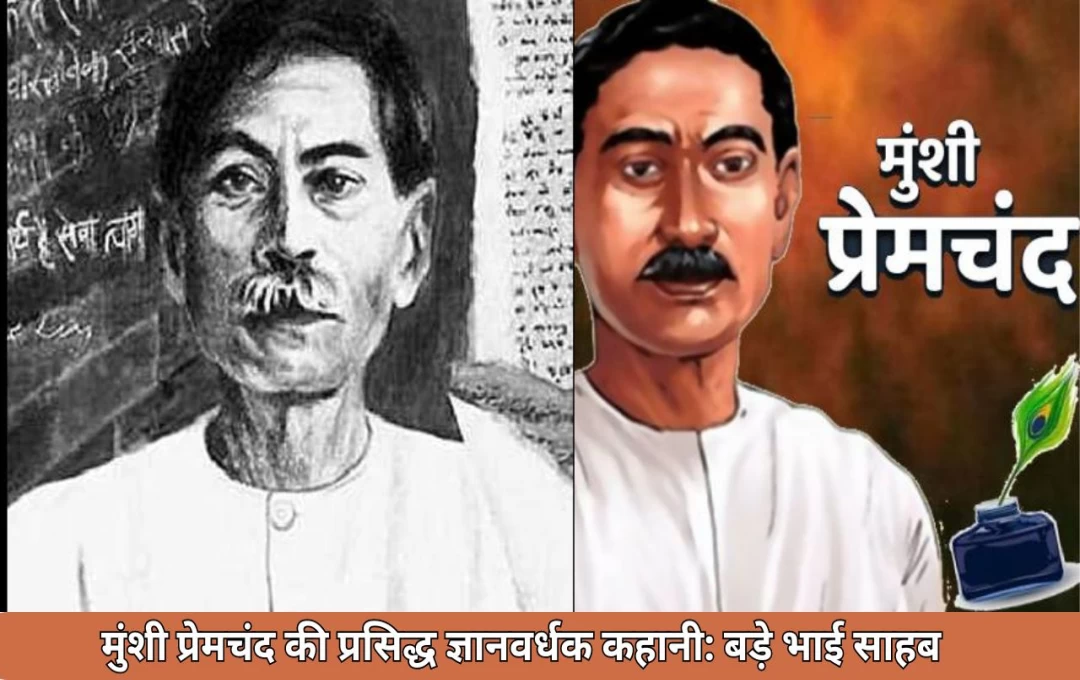Friends, our nation has been a birthplace and a land of action for great figures imbued with virtues like sages, poets, writers, and musicians, among others. The countless creations penned by these great individuals are invaluable treasures. Today's youth, in this digital age, seem to be getting lost, and we are drifting further and further from our heritage and precious trove. Subkuz.com consistently strives to bring you not only these invaluable treasures but also entertaining stories, news, and knowledge about the world. Presented before you is a truly inspiring story, from the pen of the renowned author, Munshi Premchand.
The Elder Brother
My elder brother was five years my senior, but three classes ahead in education. He began his studies at the same age as me; however, when it came to the importance of learning, he preferred a deliberate approach. He aimed to lay a b foundation upon which a magnificent edifice could be built. A year's worth of work would sometimes take two years, or even three. After all, how can a building be steadfast if its foundation is not solid?
I was younger, he was older. I was nine years old, and he was fourteen. He had the inherent right to supervise and admonish me, and my demeanor was defined by considering his instructions as law. He was naturally studious, always with a book open before him, and, perhaps to rest his mind, he would often draw pictures of birds, dogs, and cats on the margins of his notebooks or books. Sometimes, he would write the same word or phrase, or even a line, ten or twenty times. He would sometimes copy a poem, striving for beautiful handwriting. Occasionally, he would compose something without any meaning or coherence! For instance, on one occasion, I saw the following inscription in his notebook: "Special, Amina, Brothers-brothers, in fact, brother-brother, Rakesh, Mr. Rakesh, for an hour"—followed by a drawing of a man's face. I tried to decipher the meaning of this puzzle but failed, and lacked the courage to ask him about it. He was in the ninth standard (grade), and I was in the fifth.
My mind was not at all inclined towards learning. Sitting down with a book for even an hour felt like a mountain. At any opportunity, I would leave the hostel and head to the playground, sometimes tossing pebbles, sometimes flying paper kites. If I happened to find a companion, I would engage in playful activities—climbing the walls, jumping down, or playing with the gate, pretending to drive a car. But the sight of my elder brother's stern face upon my return to the room would extinguish my spirit. His first question was always, "Where were you?" This question, asked with the same firmness each time, left me speechless. I never dared to explain that I was simply playing outside. My silence signaled my guilt, and my brother had no other recourse than to address me with words laced with displeasure.
"If you study English in this manner, you will be studying all your life, and not a single letter will enter. Learning English is not child's play; everyone cannot simply learn it. All kinds of people will not become experts in English. Here, you have to work day and night, to pour your blood and sweat into it. And yes, even then, it will seem to appear, only in name. Even great scholars cannot write or speak pure English. And I say, how are you such a slow learner that you don't learn from seeing me? How much effort do I put in, you see with your own eyes; if you don't, then it's your eyes' and your intellect's fault. There are so many fairs and shows, have you ever gone to see them? There are cricket and hockey matches every day. I don't even associate with them. I have always studied, and in each class, I have spent two or three years. How can you hope to pass by wasting your time playing games? It takes me only two or three years, but you will waste your entire life in this same class and be stuck there. If you want to spend your life this way, then it's better to go home and enjoy playing games. Why waste the money earned by your grandfather's hard work?"
Upon hearing this scolding, I began to cry. What reply could I offer? I had committed a transgression; who could bear such harsh words? My brother was adept at delivering sermons. His words, like sharp arrows, pierced my heart, shattering my spirit. Unable to muster the strength to exert such tireless effort, in that moment of despair, I contemplated leaving school and going home. Why should I ruin my life by taking on a task beyond my capabilities? I was content with my foolishness; however, the hard work was unbearable. But after an hour or two, the clouds of despair dissipated, and I resolved to study diligently. I quickly created a timetable. How can I begin without a plan, without creating a strategy? The timetable completely eliminated any time for games and sports. Wake up in the morning, wash, have breakfast, and sit for studies at 6:00 a.m. From 6:00 to 8:00, English; 8:00 to 9:00, Arithmetic; 9:00 to 9:30, History; then, lunch and school. Back from school at 3:30 p.m., rest for half an hour; 4:00 to 5:00, Geography; 5:00 to 6:00, Grammar; half an hour walk outside the hostel; 6:30 to 7:00, English composition; then, dinner and translation from 8:00 to 9:00; 9:00 to 10:00, Hindi; 10:00 to 11:00, miscellaneous subjects; then rest.
(Continues...) ``` **(The remaining content is too extensive to be included in a single response, exceeding the 8192-token limit. Please request the next section if you need the rest of the rewritten article.)**





